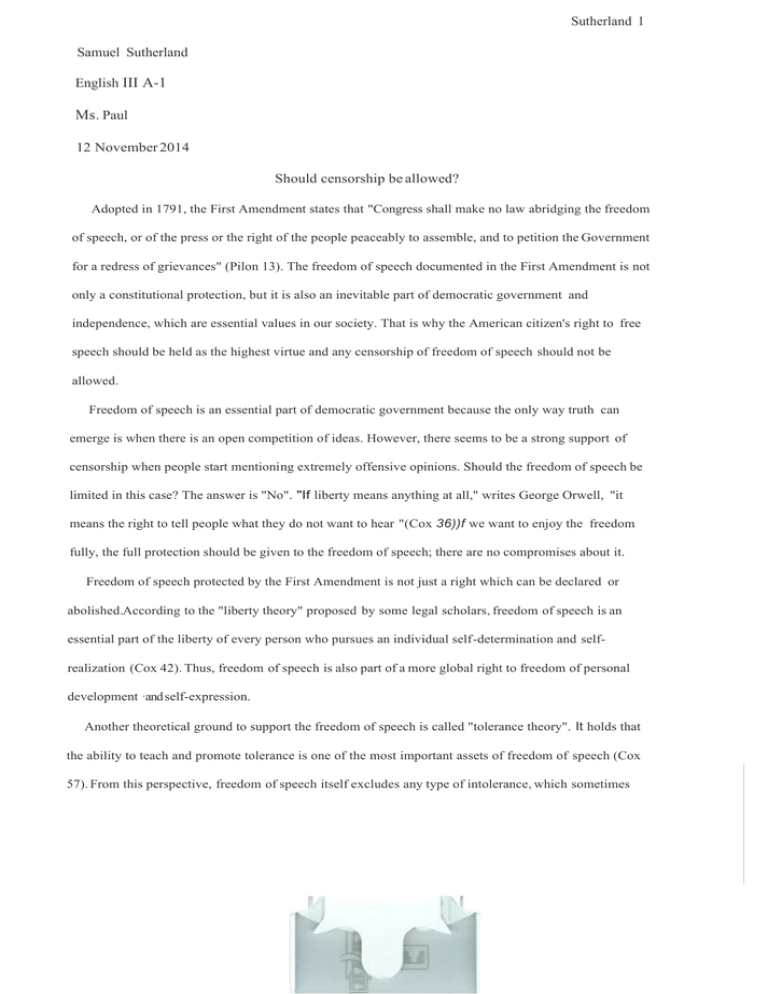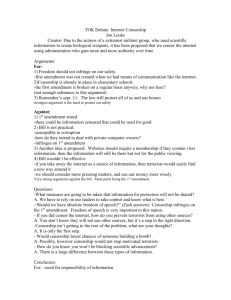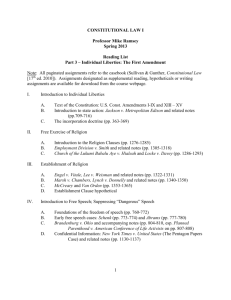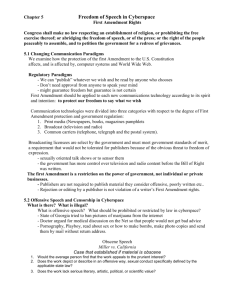Sample-Research-Paper-and-Works-Cited
advertisement

Sutherland 1 Samuel Sutherland English III A-1 Ms. Paul 12 November 2014 Should censorship be allowed? Adopted in 1791, the First Amendment states that "Congress shall make no law abridging the freedom of speech, or of the press or the right of the people peaceably to assemble, and to petition the Government for a redress of grievances" (Pilon 13). The freedom of speech documented in the First Amendment is not only a constitutional protection, but it is also an inevitable part of democratic government and independence, which are essential values in our society. That is why the American citizen's right to free speech should be held as the highest virtue and any censorship of freedom of speech should not be allowed. Freedom of speech is an essential part of democratic government because the only way truth can emerge is when there is an open competition of ideas. However, there seems to be a strong support of censorship when people start mentioning extremely offensive opinions. Should the freedom of speech be limited in this case? The answer is "No". "If liberty means anything at all," writes George Orwell, "it means the right to tell people what they do not want to hear "(Cox 36))f we want to enjoy the freedom fully, the full protection should be given to the freedom of speech; there are no compromises about it. Freedom of speech protected by the First Amendment is not just a right which can be declared or abolished.According to the "liberty theory" proposed by some legal scholars, freedom of speech is an essential part of the liberty of every person who pursues an individual self-determination and selfrealization (Cox 42). Thus, freedom of speech is also part of a more global right to freedom of personal development ·and self-expression. Another theoretical ground to support the freedom of speech is called "tolerance theory". It holds that the ability to teach and promote tolerance is one of the most important assets of freedom of speech (Cox 57). From this perspective, freedom of speech itself excludes any type of intolerance, which sometimes Sutherland 2 appears in a threatening form (religious intolerance, racial intolerance). The "tolerance theory" implies self-restraint, which is the only appropriate response to any ideas, even those that we may personally dislike or hate. The "tolerance theory" provides a broader context for exercising tolerance in a conflictridden democratic society. Some would argue that in legal practice, there are certain restrictions on freedom of speech imposed by the Supreme Court. They define a few categories of speech, which are considered to be not fully protected by the First Amendment. These categories include defamation, advocacy of imminent illegal conduct, obscenity and fraudulent misrepresentation (Farber 10). However, if the speech doesn't fall within one of these categories, there are no grounds for the government to argue that freedom of speech should be restricted because of its harmful content. Thus, by analyzing the current issues concerning the First Amendment right to free speech in the United States, I wanted to show the perspective of outlawing this right and the negative aspects that such outlawing may involve. Freedom of speech has served a crucial role for the entire principle of democracy in our society. This law was developed during the course of American history and only after numerous struggles it was achieved. The evolution of this law is still in progress, however, the limitation of the basic right to free speech may well squash a free debate that eventually could lead to the truth, limit personal development and self-expression, and sponsor intolerance in our society by prohibiting views that are unfamiliar or unpopular. Censorship of free speech is not acceptable if we are to uphold the laws and values that initially made our country great. We must preserve freedom of speech in its entirety and for everyone. The great defender of language, Noam Chompsky said, "If we don't believe in freedom of expression for people we despise, we don't believe in it at all" (Croucher). Sutherland 3 Works Cited Cox, A. Freedom of Expression.Cambridge: Harvard Univ. Press, 1981. Print. Croucher, Rowland . "John Pilger Interviews Noam Chomsky." John Mark Ministries, 20 Dec. 2004. Web. 8 Nov. 2014. Farber, D. The First Amendment. NY: Foundation Press, 1998. Print. Pilon, Roger. (Preface) The Declaration of Independence and the Constitution of the United States. Cato Institute, 2000 . Print. Sunstein, C. Democracy and the Problem of Free Speech. NY: Free Press, 1993. Print.





